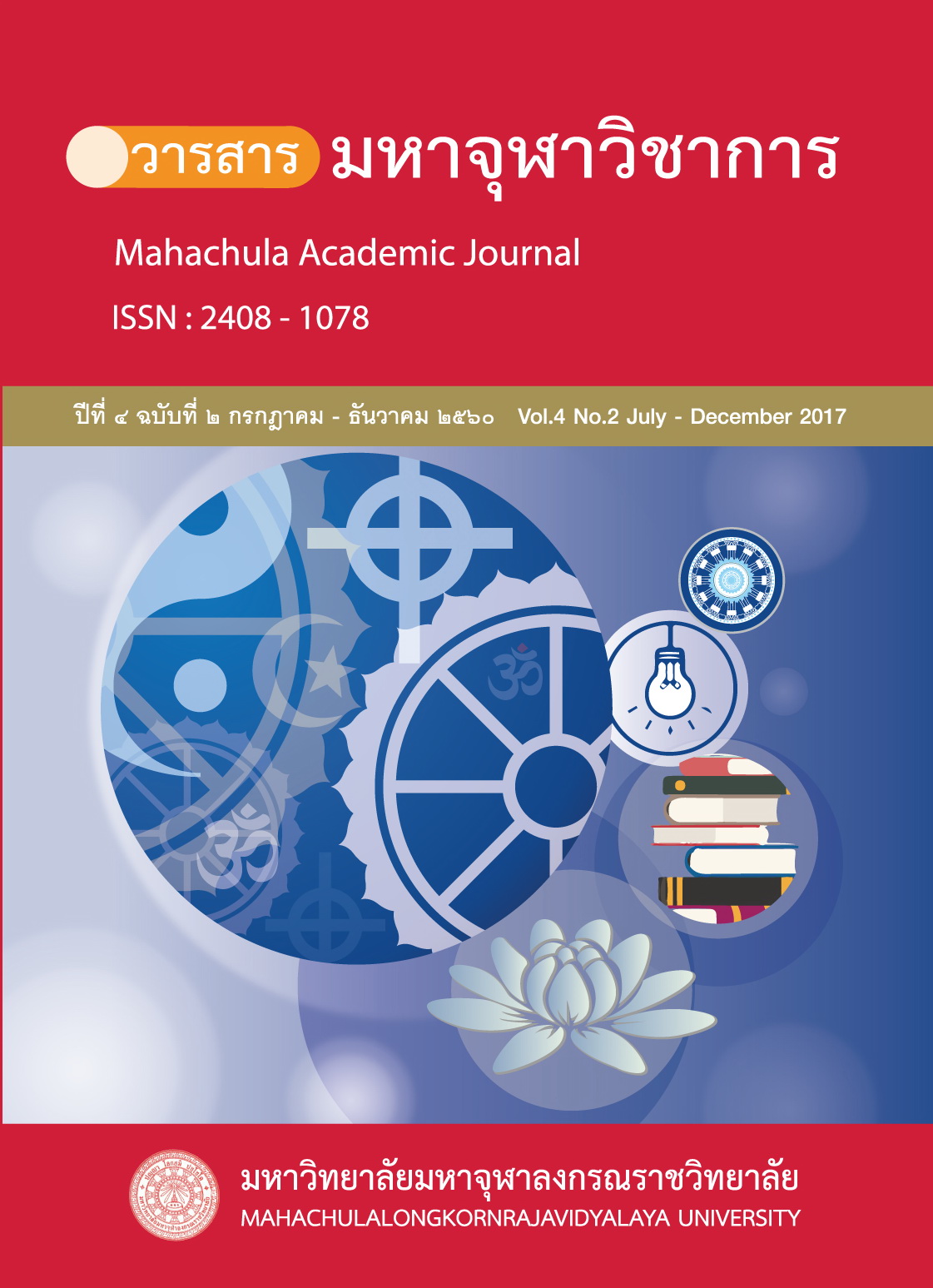The Integration of Buddhist Principles in Student Counseling for Sustainable Development
Main Article Content
Abstract
This article is the integration of Buddhist principles in student counseling by studying the concept of psychological and Buddhist principles. The integration is aimed to obtain a new model of counseling for developing student perfectly in terms of behavior, mind, and wisdom. This would be the development resulting to equilibrium and sustainability. Three objectives are namely 1) to study the theory of student
counseling in psychology, 2) to study how to apply Buddhist principles and methods for student counseling, and 3) to present the guideline of student counseling based on Buddhist principles for sustainable development. Three types of data have been studied: 1) collecting knowledge from Buddhist scriptures and psychology textbooks relating to student counseling, 2) from in-depth interview with 12 experts to analyze
the causes of problem and the solutions for constructing the model, and 3) from focus-group discussion.
The research findings show that this new model consists of four sections: Firstly, a consultant (student) should realize the path of accomplishment (Iddhipãda) and the analytical thinking (Yonisomanasikãra). Secondly, a counselor (teacher) should realize qualities of a good friend (Kalyãnamitta) and sublime states of mind (Brahmavihãra) and capable of using 9 steps of student counseling process. Thirdly, the counseling
technique is an integration of Carl Ransom Rogers’s theory comprising 7 steps together with Buddha’s manner of teaching and Sikkhã 3 (Threefold Training). This integration obtains 9 steps of student counseling process namely remind, acquaint, ignore defects, sympathize, alert to conscience, strengthen mind, find out solutions, practice faithfully, and self-relying sustainably. Lastly, the cultivation (Bhãvanã 4) can be applied from the student counseling evaluation such as physical, moral, emotional and wisdom development. Students would achieve quality thinking to a perfect self-development and self-understanding, including society and environment realistically. In addition,students would be able to solve their problems themselves and find self-adjustment for their living in the society and environment happily.
Article Details
References
พระธรรมปิฎก (ป.อ. ปยุตฺโต). พัฒนาคุณภาพชีวิตด้วยจิตวิทยาแบบยั่งยืน. กรุงเทพมหานคร: มูลนิธิพุทธธรรม, ๒๕๔๓.
พระพรหมคุณาภรณ์ (ป.อ. ปยุตฺโต). พุทธธรรม (ฉบับปรับขยาย). พิมพ์ครั้งที่ ๓๘. กรุงเทพมหานคร: ผลิธัมม์, ๒๕๓๘.
พระพรหมคุณาภรณ์ (ป.อ. ปยุตฺโต). ธรรมนูญชีวิต พุทธจริยธรรมเพื่อชีวิตที่ดีงาม. พิมพ์ครั้งที่ ๘๐. กรุงเทพมหานคร: บริษัทพิมพ์สวย จำกัด, ๒๕๔๐.
พระพรหมคุณาภรณ์ (ป.อ. ปยุตฺโต). พจนานุกรมพุทธศาสน์ ฉบับประมวลธรรม. พิมพ์ครั้งที่ ๑๓. กรุงเทพมหานคร: เอส.อาร์พริ้นติ้งแมสโปรดักส์, ๒๕๔๘.
พระพรหมคุณาภรณ์ (ป.อ. ปยุตฺโต). สู่การศึกษาแนวพุทธ. กรุงเทพมหานคร: มูลนิธิพุทธธรรม, ๒๕๔๘.
พระพรหมคุณาภรณ์ (ป.อ. ปยุตฺโต). “หัวใจพระพุทธศาสนา”. พุทธจักร. ปีที่ ๖๑ ฉบับที่ ๕ (พฤษภาคม ๒๕๕๐): ๗.
มหาจุฬาลงกรณราชวิทยาลัย. พระไตรปิฎกภาษาไทย ฉบับมหาจุฬาลงกรณราชวิทยาลัย. กรุงเทพมหานคร: โรงพิมพ์มหาจุฬาลงกรณราชวิทยาลัย, ๒๕๓๙.
มหาวิทยาลัยสุโขทัยธรรมาธิราช. เอกสารการสอนชุดวิชา เทคนิคการปรึกษาเบื้องต้น. กรุงเทพมหานคร: มหาวิทยาลัยสุโขทัยธรรมาธิราช, ๒๕๔๑.
สมเด็จพระญาณสังวร (เจริญ สุวฑฺฒโน). พรหมวิหาร ๔. กรุงเทพมหานคร: โรงพิมพ์ห้องภาพสุวรรณ, ๒๕๒๗.
C.T. Morgan, et.al, Introduction to Psychology. New York: McGraw- Hill International, 1994.
Howard, G.S. Culture Tales. “A Narrative Approach to Thinking, Cross Cultural Psychology, and Psychotherapy”. American Psychologist, 46(3), 1991: 187-197.


